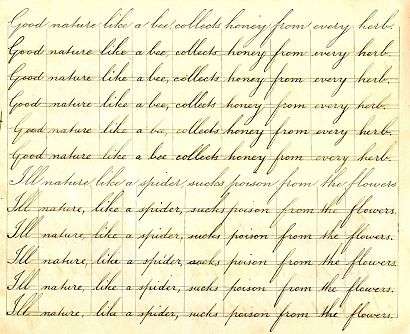The Gods of the Copybook Headings
"The Gods of the Copybook Headings" is a poem by Rudyard Kipling, characterized by biographer Sir David Gilmour as one of several "ferocious post-war eruptions" of Kipling's growing reactionary sentiment about the state of Anglo-European society.[1] It was first published in the Sunday Pictorial of London on October 26, 1919; in America, it was published as "The Gods of the Copybook Maxims" in Harper's Magazine in January, 1920.[2]

In the poem, Kipling's narrator counterposes the "Gods" of the title, who embody "age-old, unfashionable wisdom," against "the Gods of the Market-Place" who represent the "habits of wishful thinking" into which society had fallen in the early 20th century.[3]
The "copybook headings" to which the title refers were proverbs or maxims, often drawn from sermons and scripture extolling virtue and wisdom, that were printed at the top of the pages of copybooks, special notebooks used by 19th-century British school-children. The students had to copy the maxims repeatedly, by hand, down the page. The exercise was thought to serve simultaneously as a form of moral education and penmanship practice.
Modern critical interpretation
Kipling's narrative voice contrasts the eternal wisdom of these commonplace texts with the fashionable and naïve ideas of "the Market-Place," making oblique reference to feminism ("the ... Feminian Sandstones"), Lloyd George and Liberal efforts at disarmament ("the Cambrian measures"), and socialist policies advocated by trade-unionists, many of whom were coalminers ("the Carboniferous Epoch").[4]
In a footnote to a philosophical essay, Francis Slade compared Kipling's theme to Horace's Epistles I.10 ("The Advantages of Country Life") in which the Roman poet says:
Drive Nature off with a pitchfork, she’ll still press back, And secretly burst in triumph through your sad disdain.[5]
According to Slade, while the poem's verbosity is "far removed from Horace's elegant succinctness," it does "make the same point with some force."[6] A writer on economics has described the poem as "beautifully captur[ing] the thinking of Schumpeter and Keynes."[7]
T. S. Eliot included the poem in his 1941 collection A Choice of Kipling's Verse.
Excerpt
As I pass through my incarnations in every age and race,
I make my proper prostrations to the Gods of the Market-Place.
Peering through reverent fingers I watch them flourish and fall,
And the Gods of the Copybook Headings, I notice, outlast them all.
...
With the Hopes that our World is built on they were utterly out of touch.
They denied that the Moon was Stilton; they denied she was even Dutch.
They denied that Wishes were Horses; they denied that a Pig had Wings.
So we worshipped the Gods of the Market Who promised these beautiful things.
...
Then the Gods of the Market tumbled, and their smooth-tongued wizards withdrew,
And the hearts of the meanest were humbled and began to believe it was true
That All is not Gold that Glitters, and Two and Two make Four—
And the Gods of the Copybook Headings limped up to explain it once more.
• • • • • • •
As it will be in the future, it was at the birth of Man—
There are only four things certain since Social Progress began:—
That the Dog returns to his Vomit and the Sow returns to her Mire,
And the burnt Fool's bandaged finger goes wabbling back to the Fire;
And that after this is accomplished, and the brave new world begins
When all men are paid for existing and no man must pay for his sins,
As surely as Water will wet us, as surely as Fire will burn,
The Gods of the Copybook Headings with terror and slaughter return![8]— Stanzas 1, 4, 8-10
References
- David Gilmour (2002). The Long Recessional: The Imperial Life of Rudyard Kipling. Farrar, Strauss, & Giroux. p. 275. Retrieved 2019-12-17.
The Gods of the Copybook Headings.
- "Harper's Magazine 1920". Retrieved 1 July 2020.
- Andrew Rutherford (ed.). War Stories and Poems - Rudyard Kipling,. Retrieved 2012-12-11.
- David Gilmour (2002). The Long Recessional: The Imperial Life of Rudyard Kipling. Macmillan. p. 275. Retrieved 2012-12-11.
The Gods of the Copybook Headings.
- "Horace (65 BC–8 BC) - The Epistles: Book I Epistle X". www.poetryintranslation.com. Retrieved 2019-12-18.
- Francis Slade. Beauty, Art, and the Polis. Retrieved 2012-12-11.
- Bogle, John C. (2010-10-26). Don't Count on It!: Reflections on Investment Illusions, Capitalism, "Mutual" Funds, Indexing, Entrepreneurship, Idealism, and Heroes. John Wiley & Sons. ISBN 978-0-470-94902-3.
- Kipling, Rudyard (1940). Rudyard Kipling's Verse (Definitive ed.). Garden City, NY: Doubleday. pp. 801–803. OCLC 225762741.
External links
| Wikisource has original text related to this article: |
- Full Text at kipling.org.uk
- The Gods of the Copybook Headings by Rudyard Kipling, 1865-1936 (includes a reading in MP3 format)